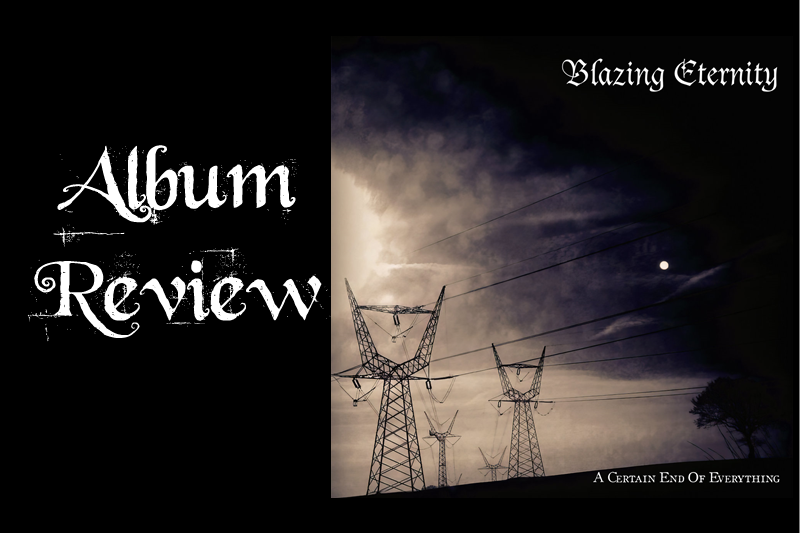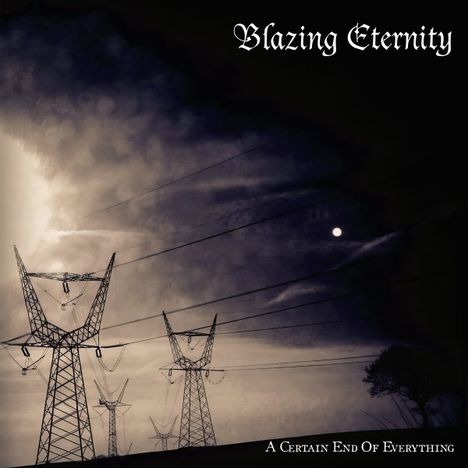
Release date: 19.04.2024
Label: Mighty Music
Genre: Melodic Black Metal
Playing time: 46:10
Tracklist:
- One Thousand Lights
- The Secrets of White
- A Certain End of Everything
- The Ghosts of Another Broken Life
- No Bringer of Light
- Your Mountains Will Drown Again
- The Bells

It is no exaggeration to say that when a band releases a new album after 21 (!) years, there is a certain feeling that not every release, especially a predictable one, can develop. And this is especially true for a band like Blazing Eternity, who despite their absence have always been able to play their way into the hearts of new listeners with their old albums. And even if those who have known the band for a very long time, perhaps not as long as the aforementioned absence, are surprised that there is something new to be heard again, it can certainly be said that there must be something special about such a release.
It is therefore necessary to add a certain amount of history to these lines. Blazing Eternity first formed in 1991 under the name Ancient Sadness, a black metal project that only resulted in a demo called Tragedies two years later. The band was renamed to its current name in the same year, and recorded three demos between 1996 and 1998. In 2000, the first album was released on a label called Prophecy Productions , which was still young at the time and is now a well known and respected name. With Times and Unknown Waters , the Danes from Copenhagen created a work that is still unrivalled 24 years later. The atmosphere created here, at least according to this writer, is a very special one, anticipating much of what would later become the basic mood of post black metal and, in part, post DSBM. Musically, the album can be described as melodic black metal with elements of doom. The very first song, Concluding the Dive of Centuries , already sucks the listener into a very strange sphere that conveys melancholy, sadness and disappointment throughout the album without losing touch with a certain hopeful thought. And this is mainly due to the musical elements, because here we don’t find classic DSBM about the aforementioned themes, because the melodies, paired with hopeful, driving riffs in the rhythm guitar and clean passages, give off an incredible energy that can certainly be channelled into something positive (reference track: Dark Summernights of Eternal Twilight). The vocals are also a very special part of this, which are often performed in an interplay of screams and clean, spoken parts and represent a very original and unique element in the way they have been realised. Although a page-long hymn could be written about this album, we will now continue with the actual review. But it should be emphasised once again that this album is certainly one of the greatest complete works in this field of music, atmosphere and mood and can definitely be considered an inspiring and formative album for younger musicians than the Danes who are moving in a similar direction.
The second album A World to Drown In followed in 2003, and can be categorised as gothic metal. A review, or whatever you want to call such lines, is always subjective. And so the writer here has to admit that this release is in stark contrast to the previous one. While Times and Unknown Waters¸ as should be clear by now, is one of the best albums of this period, the second one completely misses the mark. For what it is, for this style and its fans and not least for the musicians at the time, otherwise it wouldn’t have been created the way it was, it’s certainly just as good an album. It’s just that it doesn’t suit the style of the writer, which is why I don’t want to say too much about it here. Maybe this is also due to the fact that the first album created such high expectations, which are difficult to fulfil, because the bar for a great album has been set immensely high. Nevertheless, everyone should give A World to Drown In a chance of their own, because if it finds the right listeners, it can certainly generate enthusiasm. So here we are, 21 years later, without really knowing what’s in store for us. Of course, there is a certain idea, and with it a certain ambition, but after so much time, after so much diversity, the excitement of the musical rebirth prevails, which in all experience cannot be negative.
At first listen, A Certain End of Everything sounds much more like the first album, which may be good news for some. Although the overall sound was already very good in 2000, nothing has changed as Markus Stock is back on board, which for connoisseurs usually means great music. What has definitely changed is that not only the sound, but also the overall interplay, seems much more modern. This may be due to the modern mix, but certainly also to the use of synthesizers, which constantly support the atmosphere in the background. All in all, we find a work that can be categorised as melodic post-black metal and in a way, without wanting to constantly draw comparisons with Times and Unknown Waters , develops what was started in 2000 or at the end of the 90s. Some songs, some more than others, seem as if they were written twenty years ago, which is certainly not completely absurd. What is also very impressive is that despite all the modern aspects of the sound and songwriting, there are still elements of the past that connect them. These include the vocals of singer Peter Mesnickow, which almost sound as if there has never been a break between releases. The clean vocal parts have also been reintroduced into the combination, as for example on the title track; different, but no less well implemented, perhaps another element of modernisation. As I said, the songwriting has also been given a modern touch, but the impression remains that the songs, perhaps in a slightly different form, would have been suitable for earlier releases. Instrumentalist Morten Lybecker proves impressively that the essence of a band and its own style is not only in the sound or in the use of modern or old school elements, but in the concept, in the heart of what the songwriter defines as fundamental for himself, first grows up and then can blossom again and again under different circumstances, even if twenty years may lie in between. So, especially from a musician’s point of view, there’s nothing left to do but tip our hats. Not to forget drummer Lars Korsholm, who once again did a more than solid job, but unfortunately this writer has relatively little knowledge of his work, so there is little to say here.
Ratings in numerical form do not do justice to the musical work of any band anyway, and this is especially true here. For the one or other new listener, for those who like it a bit more raw or who simply stumble a bit when listening to more modern sounding albums, this album may seem good, but not necessarily outstanding. Anyone else who prefers this style of music will certainly find something very special here. For this writer, as far as the sound is concerned, it’s more about the fact that Blazing Eternity is a band that has been loved for many years, where people are just happy to have something new, and this factor overrides my personal taste, which is not really orientated towards such modern and polished productions. But apart from that, it has to be said that the Danes know exactly how to create this melancholic, sometimes sad and yet hopeful mood in order to touch the listener. Therefore, A Certain End of Everything can be seen as a complete work of art which makes a detailed description of every single song superfluous. This is an album that can be recommended to everyone, and to which everyone can certainly find at least a little access.
Antworten